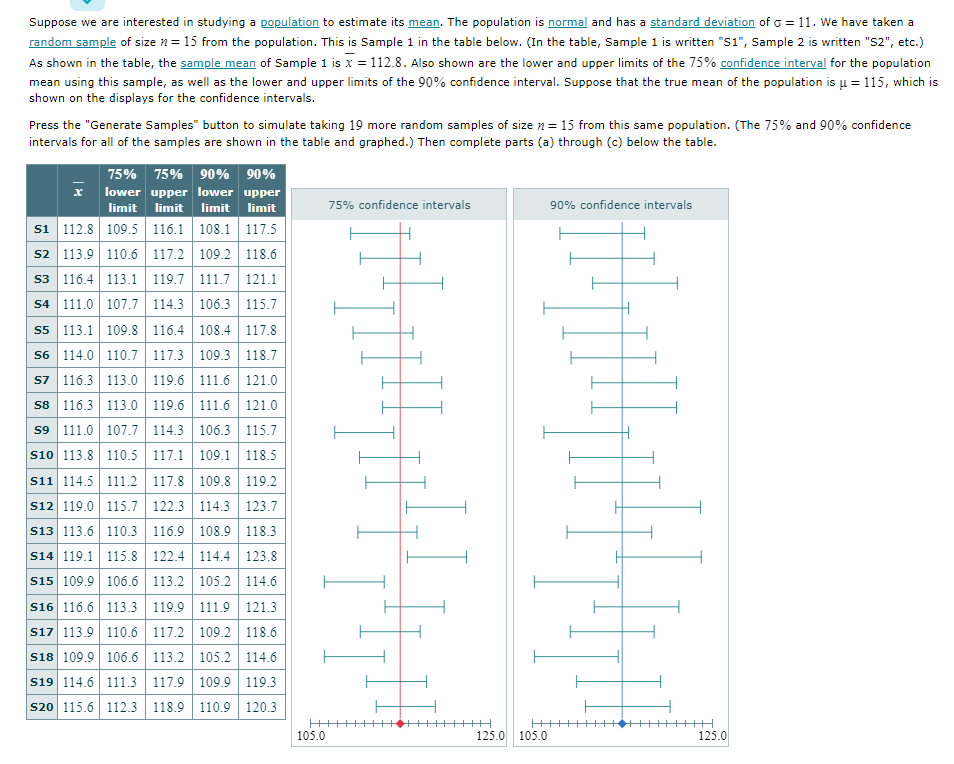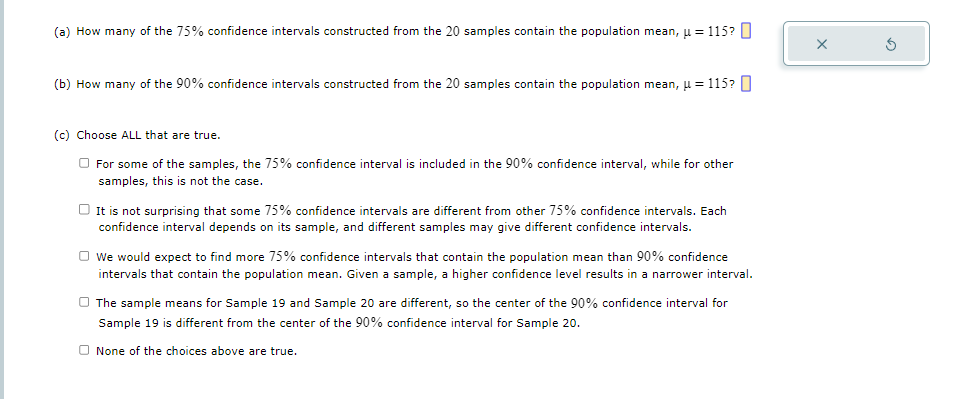(a) How many of the 75% confidence intervals constructed from the 20 samples contain the population mean, u = 115? (b) How many of the 90% confidence intervals constructed from the 20 samples contain the population mean, μ = 115? (c) Choose ALL that are true. For some of the samples, the 75% confidence interval is included in the 90% confidence interval, while for other samples, this is not the case. It is not surprising that some 75% confidence intervals are different from other 75% confidence intervals. Each confidence interval depends on its sample, and different samples may give different confidence intervals. We would expect to find more 75% confidence intervals that contain the population mean than 90% confidence intervals that contain the population mean. Given a sample, a higher confidence level results in a narrower interval. The sample means for Sample 19 and Sample 20 are different, so the center of the 90% confidence interval for Sample 19 is different from the center of the 90% confidence interval for Sample 20. None of the choices above are true.
(a) How many of the 75% confidence intervals constructed from the 20 samples contain the population mean, u = 115? (b) How many of the 90% confidence intervals constructed from the 20 samples contain the population mean, μ = 115? (c) Choose ALL that are true. For some of the samples, the 75% confidence interval is included in the 90% confidence interval, while for other samples, this is not the case. It is not surprising that some 75% confidence intervals are different from other 75% confidence intervals. Each confidence interval depends on its sample, and different samples may give different confidence intervals. We would expect to find more 75% confidence intervals that contain the population mean than 90% confidence intervals that contain the population mean. Given a sample, a higher confidence level results in a narrower interval. The sample means for Sample 19 and Sample 20 are different, so the center of the 90% confidence interval for Sample 19 is different from the center of the 90% confidence interval for Sample 20. None of the choices above are true.
MATLAB: An Introduction with Applications
6th Edition
ISBN:9781119256830
Author:Amos Gilat
Publisher:Amos Gilat
Chapter1: Starting With Matlab
Section: Chapter Questions
Problem 1P
Related questions
Question
100%

Transcribed Image Text:Suppose we are interested in studying a population to estimate its mean. The population is normal and has a standard deviation of = 11. We have taken a
random sample of size n = 15 from the population. This is Sample 1 in the table below. (In the table, Sample 1 is written "S1", Sample 2 is written "S2", etc.)
As shown in the table, the sample mean of Sample 1 is x = 112.8. Also shown are the lower and upper limits of the 75% confidence interval for the population
mean using this sample, as well as the lower and upper limits of the 90% confidence interval. Suppose that the true mean of the population is μ = 115, which is
shown on the displays for the confidence intervals.
Press the "Generate Samples" button to simulate taking 19 more random samples of size n = 15 from this same population. (The 75% and 90% confidence
intervals for all of the samples are shown in the table and graphed.) Then complete parts (a) through (c) below the table.
75% 75% 90% 90%
lower upper lower upper
limit limit limit limit
S1 112.8 109.5 116.1 108.1 117.5
S2 113.9 110.6 117.2 109.2 118.6
S3 116.4 113.1 119.7 111.7 121.1
S4 111.0 107.7 114.3 106.3 115.7
S5 113.1 109.8 116.4 108.4 117.8
S6 114.0 110.7 117.3 109.3 118.7
S7 116.3 113.0 119.6 111.6 121.0
58 116.3 113.0 119.6 111.6 121.0
59 111.0 107.7 114.3 106.3 115.7
S10|113.8|110.5 | 117.1 | 109.1 | 118.5
511 1145|1112| 117.8 |1098|1192
$12 119.0 115.7 122.3 114.3 123.7
S13 113.6 110.3 116.9 108.9 118.3
S14 119.1 115.8 122.4 114.4 123.8
$15 109.9 106.6 113.2 105.2 114.6
S16 116.6 113.3 119.9 111.9 121.3
117.2 109.2 118.6
S18 109.9 106.6 113.2 105.2 114.6
S17 113.9 110.6
S19 114.6 111.3 117.9 109.9 119.3
$20 115.6 112.3 118.9 110.9 120.3
H
105.0
75% confidence intervals
H
125.0 105.0
90% confidence intervals
Ell
+
125.0

Transcribed Image Text:(a) How many of the 75% confidence intervals constructed from the 20 samples contain the population mean, μ = 115?
(b) How many of the 90% confidence intervals constructed from the 20 samples contain the population mean, u = 115?
(c) Choose ALL that are true.
For some of the samples, the 75% confidence interval is included in the 90% confidence interval, while for other
samples, this is not the case.
It is not surprising that some 75% confidence intervals are different from other 75% confidence intervals. Each
confidence interval depends on its sample, and different samples may give different confidence intervals.
We would expect to find more 75% confidence intervals that contain the population mean than 90% confidence
intervals that contain the population mean. Given a sample, a higher confidence level results in a narrower interval.
The sample means for Sample 19 and Sample 20 are different, so the center of the 90% confidence interval for
Sample 19 is different from the center of the 90% confidence interval for Sample 20.
None of the choices above are true.
X
Ś
Expert Solution
This question has been solved!
Explore an expertly crafted, step-by-step solution for a thorough understanding of key concepts.
This is a popular solution!
Trending now
This is a popular solution!
Step by step
Solved in 4 steps with 2 images

Recommended textbooks for you

MATLAB: An Introduction with Applications
Statistics
ISBN:
9781119256830
Author:
Amos Gilat
Publisher:
John Wiley & Sons Inc

Probability and Statistics for Engineering and th…
Statistics
ISBN:
9781305251809
Author:
Jay L. Devore
Publisher:
Cengage Learning

Statistics for The Behavioral Sciences (MindTap C…
Statistics
ISBN:
9781305504912
Author:
Frederick J Gravetter, Larry B. Wallnau
Publisher:
Cengage Learning

MATLAB: An Introduction with Applications
Statistics
ISBN:
9781119256830
Author:
Amos Gilat
Publisher:
John Wiley & Sons Inc

Probability and Statistics for Engineering and th…
Statistics
ISBN:
9781305251809
Author:
Jay L. Devore
Publisher:
Cengage Learning

Statistics for The Behavioral Sciences (MindTap C…
Statistics
ISBN:
9781305504912
Author:
Frederick J Gravetter, Larry B. Wallnau
Publisher:
Cengage Learning

Elementary Statistics: Picturing the World (7th E…
Statistics
ISBN:
9780134683416
Author:
Ron Larson, Betsy Farber
Publisher:
PEARSON

The Basic Practice of Statistics
Statistics
ISBN:
9781319042578
Author:
David S. Moore, William I. Notz, Michael A. Fligner
Publisher:
W. H. Freeman

Introduction to the Practice of Statistics
Statistics
ISBN:
9781319013387
Author:
David S. Moore, George P. McCabe, Bruce A. Craig
Publisher:
W. H. Freeman